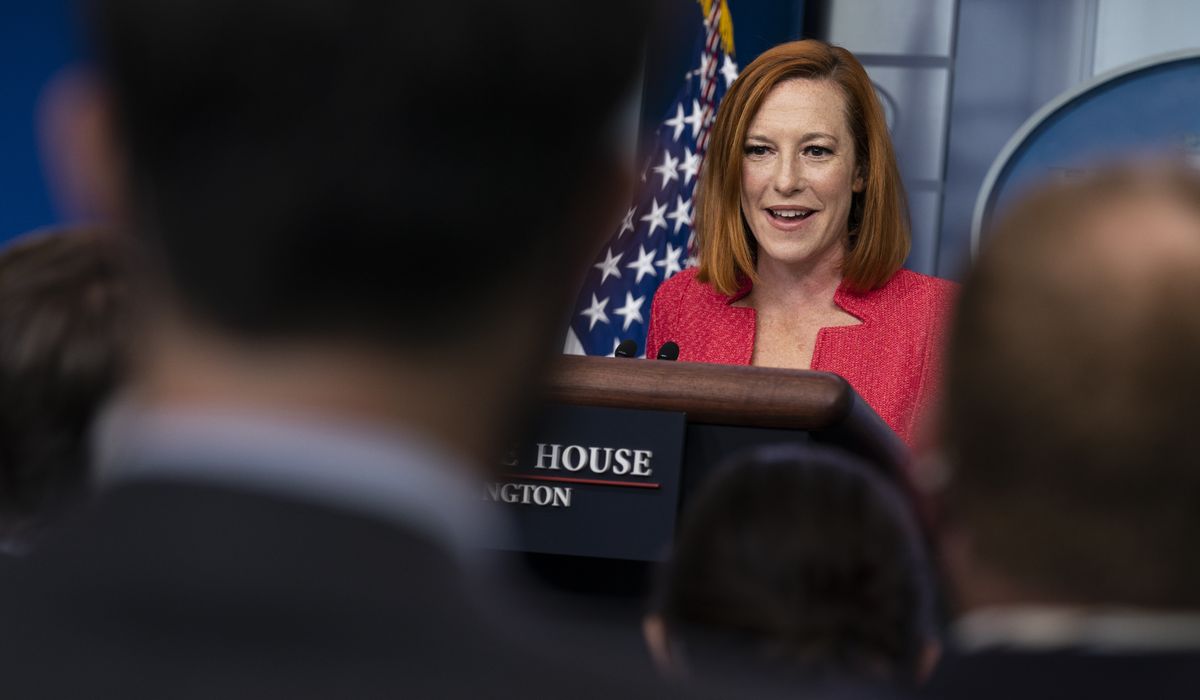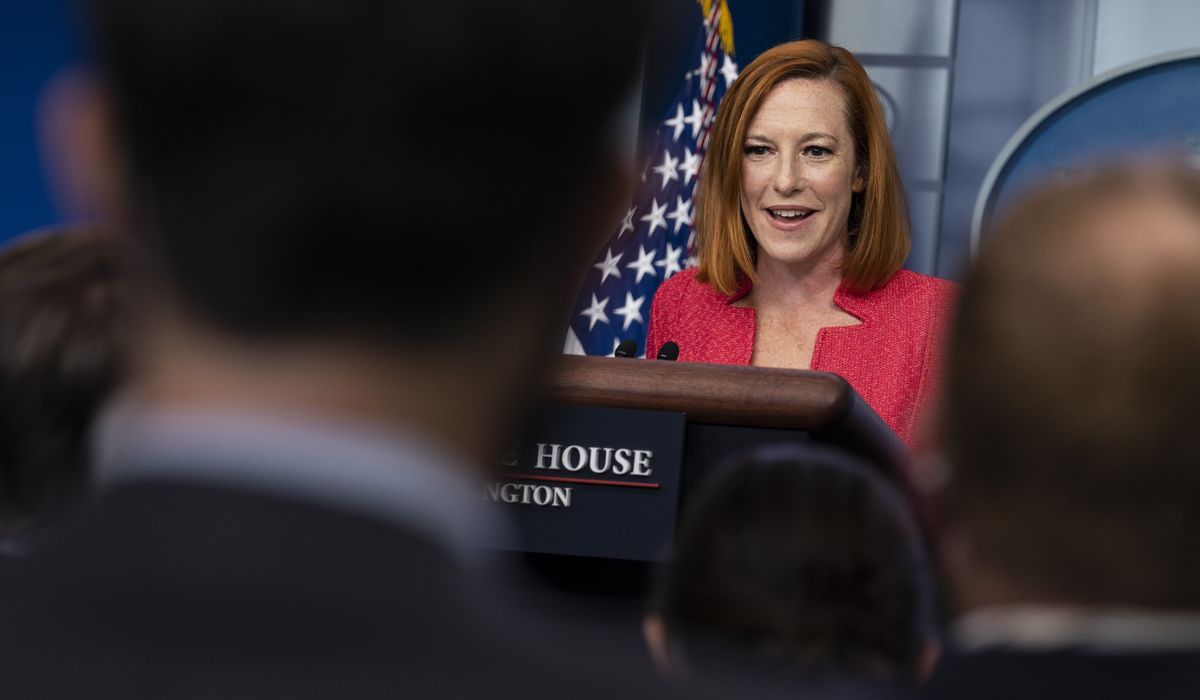
At her first press briefing in January, White House press secretary Jen Psaki pledged transparency and respect for the free press.
On Monday, Ms. Psaki complained that reporters won’t stick to whichever topic President Biden wants to talk about, chiding them for asking questions outside the administration’s daily talking points.
The change in attitude comes after several high-profile skirmishes between the president, his staff, and reporters that have undercut Mr. Biden’s campaign promise to be a champion of the free press.
Instead, reporters have complained bitterly about Mr. Biden’s unwillingness to answer questions and White House staff’s efforts to shoo them out of the room before the president veers from his scripted remarks.
Critics say White House staffers have created a protective bubble around Mr. Biden to shield him from getting testy with the press or mangling statements so Republicans can’t use such clips to raise questions about the president’s cognitive abilities.
Efforts to shut down reporters have only fueled questions about cognitive decline, rather than extinguish them, said Tim Graham, director of media analysis for the Media Research Center, a conservative media watchdog, and a former White House reporter.
“Some of these gaffes are minor, like pronouncing someone’s name incorrectly,” he said. “The problem is they know these things will be exploited by conservative media and that is what the Biden ‘p.r.’ team is worried about. The ‘p.r.’ team really hates the conservative media saying he’s senile. They don’t want a clip where he looks like he’s losing it.”
Ms. Psaki has insisted the president isn’t avoiding the press, saying he’s answered questions 135 times leading up to September.
“He certainly respects the role of the press, the role of the freedom of the press, the free press, [and] we ensure that we have press with us, of course, when we travel, that we have press with us for [brief question-and-answer sessions] in foreign capitals and we will continue to. And I think that speaks to his commitment to freedom of press around the world,” she said.
But she also revealed in a May podcast with CNN’s David Axelrod that aides encourage Mr. Biden not to engage with reporters who shout questions during his public appearances.
“That is not something we recommend,” Ms. Psaki said. “In fact, a lot of times we say `Don’t take questions.’ ”
Mr. Biden has been less accessible to the press in his first eight months than any other modern president, according to data from the University of California at Santa Barbara’s American Presidency Project.
Former President Trump was antagonistic towards the press with angry rhetoric, labeling them an “enemy of the people” and decrying outlets as “fake news.” Still, he was more accessible to the press, according to the data.
Through Mr. Biden’s first seven months, he’s had seven press conferences, including joint conferences with other world leaders, according to UC Santa Barbara.
Mr. Trump had 21 press briefings in his first year, former President Obama had 21 briefings and former President George W. Bush held 19.
Mr. Biden has also waited longer than any other president in the last 100 years to hold his first press conference.
When Mr. Biden finally faced off with the press on March 25, he had been in office for more than 60 days. By the same point in their administrations, Mr. Trump gave five news conferences and former Mr. Obama had given two.
Ms. Psaki told reporters last week that she wasn’t sure when Mr. Biden would give another press conference, adding that such an event was probably not at the top of the American public’s concern.
John Wihbey, a journalism professor at Northeastern University who has studied presidential communication, said Mr. Biden’s team is overreacting to fears he may misspeak.
“President Biden might commit a gaffe, but in recent exchanges seems quite lucid and makes jokes. I don’t think people should think it’s a liability,” he said. “They need to get over it, accept there might be a gaffe but the American ideals of free expression and free exchange are more important to convey to the world.”
Frustration among White House aides and reporters climaxed last week after journalists were clumsily rushed out of the Oval Office ahead of Mr. Biden’s meeting with United Kingdom Prime Minister Boris Johnson.
Mr. Johnson took several questions from the British press, but when American reporters started questioning Mr. Biden, White House aides shouted over them, rushing them out of the room.
The president attempted to answer a question about immigration, but the White House aides talked over his answer, rendering it undecipherable.
After the incident, the press pool immediately filed a formal complaint with Ms. Psaki’s office.
Ms. Psaki said she was unaware of the incident and suggested she was not in a position to offer an immediate solution, according to a dispatch from the White House Correspondents’ Association.
Several journalists in the room took to Twitter and vented their frustration.
One British reporter said the British press thought the shouting was out of line, calling it “an unwelcome lack of accountability.”
The next day, Ms. Psaki tried to explain away the chaos by blaming Mr. Johnson for calling on British reporters without alerting the White House in advance.
Tensions continued to simmer last Friday, when Mr. Biden griped to Indian Prime Minister Narendra Modi that the Indian press corps is “much better behaved” than their U.S. counterparts.
“I think, with your permission, you could not answer questions because they won’t ask any questions on point,” Mr. Biden said, venting that the U.S. reporters don’t stay on topic.
Ms. Psaki defended his remarks, agreeing that U.S. reporters aren’t always “on point.”
“Now I know that isn’t something that anyone wants to hear in here, but what I think he was conveying, as you know, today, he might want to talk about COVID vaccines [and] some of the questions were about that he might want to talk about, and some of the questions are not always about the topic he’s talking about in that day,” she said.
The incident with Mr. Modi is the latest example of Mr. Biden lashing out at the press.
In July, Mr. Biden snapped at an NBC News reporter for asking about the Department of Veterans’ Affairs vaccine mandate during a meeting with the Iraqi prime minister.
“You are such a pain in the neck, but I’m going to answer your question because we’ve known each other for so long,” the president said.
In June, Mr. Biden apologized to a CNN reporter after he lost his temper with her at the end of his press conference in Geneva.
Pressed on his optimistic view about his summit with Russian President Vladimir Putin, Mr. Biden shot back that the reporter “was in the wrong business,” later complaining that journalists have a negative view of life.
The president also stormed off when asked about the Afghanistan exit during a briefing to discuss Hurricane Ida. As he walked away, the president insisted that he wasn’t going to take any questions on Afghanistan.
Mr. Whibey said the president is trying to playfully tease the press in a grandfatherly way, but the tone is coming across as awkward rather than funny.
“What might be fun towel snapping with the press just isn’t hitting right,” he said. “If I were his handlers, I’d tell him to dial that back.”
Reporters’ frustration is also boiling over in the press briefing room, where several journalists have complained that Ms. Psaki is calling on the same people every day.
As Ms. Psaki concluded her briefing Wednesday, a reporter in one of the briefing room’s back rows asked her to call on journalists who sit in the back.
Although Ms. Psaki promised to start Thursday’s briefing by calling on reporters in the back, she rarely ventured beyond the first three rows, where most of the networks have seats.
A pool reporter covering Thursday’s briefing sent a note saying it ended with “many hands raised and questions unasked.”
On Friday, a White House reporter also protested when Ms. Psaki sidestepped her question about imprisoned WikiLeaks founder Julian Assange.
The reporter complained that she had been waiting for months to ask her question and then appeared exasperated, saying emails she sent Ms. Psaki about Mr. Assange had gone unanswered.







